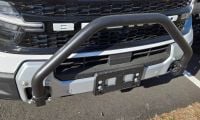Battery recycling will be the key to tackle this problem, and none other than Teslas co-founder J.B. Straubel started to work on a solution. With his company called Redwood Materials, Straubel already began with the recycling process, but the latest news suggests that his company alone could work with many large manufacturers. Redwood Material is in talks with Ford, while they already recycle battery material for Nissan and Amazon.
Interestingly enough, Redwood Materials plans to create cathodes and anode foils for the new generation of lithium-ion batteries. According to CarBuzz.com, these materials are primarily produced in Asia, so making them in the US could dramatically shift the balance of battery-production power to the USs advantage.
Ford wants severe battery price cuts
Ford's game in this business is a simple one – a Dearborn-based manufacturer wants to create a sustainable battery production solution that will bring the costs down and allow the company to have access to batteries for years to come. Now, some estimates do show that lithium-ion batteries demand in the future may dramatically exceed production capacities. Apart from that, mining cobalt, nickel, and lithium, needed for batteries, brings up many environmental concerns. Thus, recycling what we mine or produce could be the only sustainable way to satisfy demand and save the environment. As WeForum.org reports, Redwood Materials wants to create a sustainable, closed-cycle solution.
"Nevada-based company uses a combination of pyrometallurgy – burning batteries to remove unwanted organic materials and plastics – and hydrometallurgy, which uses leaching to soak lithium-ion cells in acids to dissolve the metals into a solution,“ Weforum reports.
On the other hand, the International Energy Agency (IEA) suggests that the EV battery capacity, ready for repurposing, will grow more than five times by the 2030s.
Apart from recycling, some suggest that batteries should last for longer. In an interview with the Guardian, James Pennington, the World Economic Forum’s circular economy program leader, indicated that “the best thing to do at first is to keep things in use for longer.” Now, the estimated battery exploitation period is about ten years. However, after its use in cars, batteries still have some life left in them – they could be used for other purposes – not just powering cars. Home energy storage systems are the most obvious solution.
Ford and Redwood Materials
Redwood Materials and Ford did start on the right foot:
"Increasing our nation's production of batteries and their materials through domestic recycling can serve as a key enabler to improve the environmental footprint of U.S. manufacturing of lithium-ion batteries, decrease cost and, in turn, drive up domestic adoption of electric vehicles," said Straubel, Redwood Materials CEO. "Redwood and Ford share an understanding that to truly make electric vehicles sustainable and affordable, we need to localize the existing complex and expensive supply chain network, create pathways for end-of-life vehicles, ramp lithium-ion recycling, and increase battery production, all here in America."
On the other hand, Ford president, Jim Farley commented:
"Ford is making electric vehicles more accessible and affordable through products like the all-electric F-150 Lightning, Mustang Mach-E and E-Transit, and much more to come. Our partnership with Redwood Materials will be critical to our plan to build electric vehicles at scale in America, at the lowest possible cost, and with a zero-waste approach."
Conclusion
The lithium-battery recycling business is the new billion-dollar industry. Already, startups around the world invest hundreds of billions of dollars into it. Like Redwood Materials, several companies offer solutions to the problems that will inevitably arise with the adoption of EVs. Ford's cooperation with Redwood Materials could be a step in the right direction as we head into a battery world of many unknowns.
Safet Satara is an automotive journalist and car enthusiast who has nurtured his automotive endeavors since he was 19 years old. He specializes in European cars, EV technology, and research about automotive industry issues. Safet has also written automotive pieces for Gearheads.org, Topspeed.com, Autowise.com, and various print magazines, including ProAuto. His specialty - testing cars - more than 500 tested cars under his belt. You can follow Safet via Facebook, Instagram, and Twitter.
Set Torque News as Preferred Source on Google











